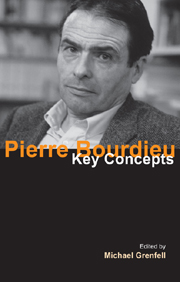Book contents
- Frontmatter
- Contents
- Contributors
- Acknowledgements
- Introduction
- PART I BIOGRAPHY, THEORY AND PRACTICE
- 1 Biography of Bourdieu
- 2 Theory of practice
- PART II FIELD THEORY: BEYOND SUBJECTIVITY AND OBJECTIVITY
- PART III FIELD MECHANISMS
- PART IV FIELD CONDITIONS
- Conclusion
- Postscript: methodological principles
- Chronology
- Bibliography
- Index
1 - Biography of Bourdieu
from PART I - BIOGRAPHY, THEORY AND PRACTICE
- Frontmatter
- Contents
- Contributors
- Acknowledgements
- Introduction
- PART I BIOGRAPHY, THEORY AND PRACTICE
- 1 Biography of Bourdieu
- 2 Theory of practice
- PART II FIELD THEORY: BEYOND SUBJECTIVITY AND OBJECTIVITY
- PART III FIELD MECHANISMS
- PART IV FIELD CONDITIONS
- Conclusion
- Postscript: methodological principles
- Chronology
- Bibliography
- Index
Summary
Introduction
The aim of this chapter is to offer an outline of Bourdieu's biography. There are various issues to consider. For much of his life, Bourdieu was against biography, both in terms of his own personal life details and, in fact, biographical studies in general. In an article published in Actes de la recherche en sciences sociales (Bourdieu 1986b), he writes of “l'illusion biographique”. Here, he sets out his major objections to conventional biographies. He takes exception to the accounts of people's lives as constructed by historians and ethnographers, not to mention sociologists. He sets himself against these “lives” for their constructed coherence and the implied objective and subjective intentions behind the action of individuals involved. He sees this tendency revealed in the very language used by biographers: “already”, “from that moment”, “from his youngest age”, “always”. Briefly, Bourdieu objects to tidy chronologies of lives lived in a sort of pre-ordered, if not preordained, manner.
Bourdieu spent most of his life avoiding reference to his personal life and, even now, we only have the most basic information (see Grenfell 2004b for a fuller account). However, there is a paradox. As we shall see, Bourdieu's reflexive approach was predicated on the sociologist “objectifying” the process of their objectification. Central to this method was the need to apply the same epistemological concepts to the “knowing subjects” themselves as to the “object” of research.
- Type
- Chapter
- Information
- Pierre BourdieuKey Concepts, pp. 11 - 26Publisher: Acumen PublishingPrint publication year: 2008
- 1
- Cited by

